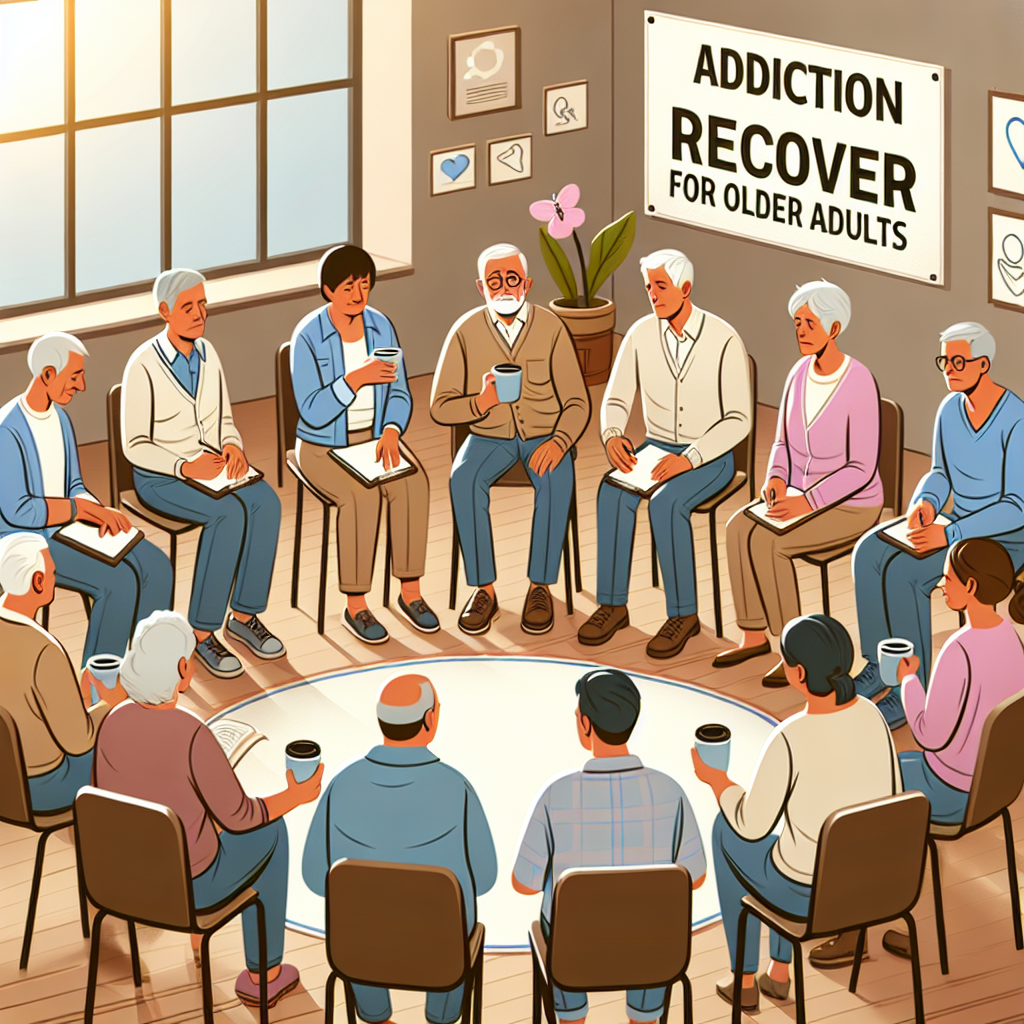-
Table of Contents

“Empowering Renewal: Specialized Addiction Recovery for Older Adults”
Introduction
Addiction recovery services for older adults are specialized programs designed to address the unique needs and challenges faced by individuals in this age group who are struggling with substance abuse. These services often incorporate a holistic approach, considering the physical, emotional, and social aspects of addiction recovery. They may include medical detoxification, counseling, support groups, and aftercare planning, all tailored to the specific health concerns and life circumstances of older adults. By providing age-appropriate care and support, these programs aim to improve the quality of life and overall well-being of older adults on their journey to recovery.
Comprehensive Addiction Recovery Services Tailored for Older Adults
Addiction recovery services have long been a critical component of public health, but the focus has often been on younger populations. However, as the demographic landscape shifts, there is a growing recognition of the need for comprehensive addiction recovery services tailored specifically for older adults. This demographic faces unique challenges that necessitate specialized approaches to treatment and recovery.
One of the primary reasons older adults require tailored addiction recovery services is the physiological and psychological changes that come with aging. As people age, their bodies metabolize substances differently, and they may be more susceptible to the harmful effects of drugs and alcohol. Additionally, older adults often have co-occurring health conditions such as diabetes, heart disease, or arthritis, which can complicate the recovery process. Therefore, addiction recovery programs for older adults must be designed to address these complex health needs, ensuring that treatment plans are both safe and effective.
Moreover, older adults may experience different social and emotional triggers for substance abuse compared to younger individuals. Loneliness, isolation, and the loss of loved ones are common issues that can lead to or exacerbate addiction in older adults. Recognizing this, many specialized programs incorporate elements of social support and community-building into their treatment plans. Group therapy sessions, peer support groups, and family counseling are often integral components of these programs, helping to create a supportive network that can significantly enhance the recovery process.
In addition to addressing the unique health and social needs of older adults, comprehensive addiction recovery services also focus on providing age-appropriate therapeutic interventions. Cognitive-behavioral therapy (CBT), motivational interviewing, and mindfulness-based stress reduction are just a few of the evidence-based therapies that can be adapted to meet the needs of older adults. These therapies not only help individuals understand and change their addictive behaviors but also equip them with coping strategies to manage stress and prevent relapse.
Furthermore, the importance of a holistic approach to addiction recovery cannot be overstated. For older adults, this often means integrating physical, emotional, and spiritual care into the treatment plan. Exercise programs tailored to an individual’s physical capabilities, nutritional counseling, and activities that promote mental well-being, such as art therapy or meditation, are all valuable components of a holistic recovery program. By addressing the whole person, these programs aim to improve overall quality of life, making long-term recovery more attainable.
Another critical aspect of addiction recovery services for older adults is the need for ongoing support and aftercare. Recovery is a lifelong journey, and older adults may require continued assistance to maintain their sobriety. This can include regular check-ins with a healthcare provider, participation in support groups, and access to resources such as sober living communities. By providing a continuum of care, these services help ensure that older adults have the support they need to navigate the challenges of recovery and maintain their progress over time.
In conclusion, comprehensive addiction recovery services tailored for older adults are essential for addressing the unique challenges this demographic faces. By focusing on the specific health, social, and emotional needs of older adults, these programs offer a more effective and compassionate approach to treatment. Through a combination of specialized therapies, holistic care, and ongoing support, older adults can achieve and maintain sobriety, leading to a healthier, more fulfilling life. The growing recognition of these needs is a positive step forward, offering hope and inspiration to older adults struggling with addiction.
The Importance of Specialized Addiction Recovery Programs for Seniors
Addiction recovery services tailored specifically for older adults are not only available but are also crucial for addressing the unique needs of this demographic. As the population ages, the number of seniors struggling with substance abuse is on the rise, making it imperative to develop specialized programs that cater to their distinct physical, emotional, and social requirements. Understanding the importance of these specialized services can inspire hope and encourage older adults and their families to seek the help they need.
One of the primary reasons specialized addiction recovery programs for seniors are essential is the physiological differences between older adults and younger individuals. As people age, their bodies metabolize substances differently, and they are more likely to have co-occurring health conditions that can complicate treatment. For instance, an older adult may be dealing with chronic pain, diabetes, or heart disease, which can be exacerbated by substance abuse. Specialized programs are designed to address these complexities, ensuring that treatment plans are safe and effective for older adults.
Moreover, the psychological and emotional aspects of addiction in seniors often differ from those in younger populations. Older adults may face unique stressors such as retirement, the loss of a spouse, or social isolation, which can contribute to substance abuse. Specialized recovery programs recognize these factors and incorporate therapeutic approaches that address grief, loneliness, and the transition into later life stages. By providing a supportive environment that acknowledges these challenges, these programs can help seniors build resilience and find healthier ways to cope.
In addition to addressing physical and emotional needs, specialized addiction recovery services for older adults also consider the social dynamics that can influence recovery. Many seniors may feel a sense of shame or stigma associated with seeking help for addiction, particularly if they have lived most of their lives without substance abuse issues. Creating a community of peers who share similar experiences can be incredibly empowering. Group therapy sessions and support groups specifically for older adults can foster a sense of belonging and reduce feelings of isolation, which are critical components of successful recovery.
Furthermore, family involvement is often a key element in the recovery process for older adults. Specialized programs frequently offer family counseling and education to help loved ones understand the nature of addiction and how they can support their senior family member. This holistic approach not only aids in the recovery of the individual but also strengthens family bonds and improves overall well-being.
The importance of specialized addiction recovery programs for seniors cannot be overstated. These programs are designed to meet the unique needs of older adults, addressing the physical, emotional, and social aspects of addiction in a comprehensive manner. By providing tailored treatment plans, therapeutic support, and a sense of community, these programs offer older adults the best chance for a successful recovery.
In conclusion, the availability of specialized addiction recovery services for older adults is a beacon of hope for many. It underscores the understanding that addiction can affect anyone, regardless of age, and that recovery is possible with the right support. By recognizing and addressing the unique challenges faced by seniors, these programs not only help individuals reclaim their lives but also inspire others to seek the help they need. The journey to recovery may be challenging, but with specialized support, older adults can find the strength and resilience to overcome addiction and enjoy a healthier, more fulfilling life.
Q&A
1. Are there addiction recovery services specifically tailored for older adults?
Yes, there are addiction recovery services specifically tailored for older adults, which address their unique physical, emotional, and social needs.
2. What types of addiction recovery services are available for older adults?
Services for older adults may include age-specific therapy groups, medical detox programs, outpatient and inpatient treatment, counseling, and support groups designed to address the unique challenges faced by older individuals.
Conclusion
Yes, there are addiction recovery services specifically tailored for older adults. These services recognize the unique challenges and needs of older individuals, offering specialized treatment programs that address both substance abuse and co-occurring medical or mental health conditions common in this age group.



